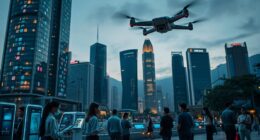Human oversight forms the backbone of building trust in AI within the consumer packaged goods industry. It guarantees AI decisions are ethical, transparent, and responsible, helping you prevent biases and align outputs with societal and company values. By continuously monitoring and reviewing AI systems, you can catch errors early and maintain fairness. This oversight boosts consumer confidence and regulatory compliance. To understand how effective oversight reveals AI’s full potential, keep exploring these essential principles.
Key Takeaways
- Human oversight ensures AI decisions in CPG align with ethical standards, consumer trust, and regulatory compliance.
- It helps identify and mitigate biases, ensuring fair and responsible AI-driven product recommendations and marketing.
- Ongoing human validation maintains transparency, accountability, and adaptability of AI systems within evolving market contexts.
- Human oversight balances AI efficiency with contextual judgment, reducing errors and false positives in critical decisions.
- Collaborative oversight fosters trust by demonstrating responsible AI use and safeguarding consumer interests in CPG.

Human oversight plays a vital role in ensuring that AI systems operate ethically, transparently, and responsibly. As you deploy AI in consumer packaged goods (CPG), your involvement helps prevent biases from creeping into decision-making processes, maintains transparency for consumers, and upholds accountability within your organization. Ethical review becomes crucial when AI influences product recommendations, marketing strategies, or supply chain decisions that impact consumers’ rights or company reputation. By actively overseeing these systems, you clarify who is responsible for outcomes, enabling prompt corrective actions without shifting blame. Continuous, real-time monitoring also becomes essential, as it helps you detect anomalies or unexpected behaviors early, requiring both technical expertise and a keen understanding of your specific industry. Your role spans the entire AI lifecycle—from validating inputs, supervising processing, reviewing outputs, to integrating feedback for ongoing improvement.
Human oversight ensures ethical, transparent AI in CPG—preventing bias, maintaining accountability, and guiding responsible decision-making throughout the AI lifecycle.
The importance of human oversight extends to mitigating risks inherent in AI models, such as discrimination, bias, or operational errors. Your review ensures AI outputs align with societal norms and your company’s core values, especially in sensitive sectors like healthcare or legal services within the CPG space. You set ethical guidelines, scrutinize AI recommendations for fairness, and ensure compliance with regulations. In doing so, you complement AI’s capabilities by adapting its decisions to evolving contexts, diverse consumer needs, and complex social considerations that machines cannot fully grasp. The European Union’s AI Act underscores this necessity by requiring human involvement in high-risk AI applications to facilitate meaningful interventions. Your guidance becomes indispensable in steering these legal and ethical landscapes, ensuring AI adoption remains responsible. Furthermore, leveraging insights from divorce statistics can enhance understanding of consumer behaviors and preferences in the CPG sector.
Effective oversight demands a solid understanding of AI design, algorithms, and data sources. You must stay informed about relevant laws, regulations, and ethical principles. Access to multidisciplinary expertise—technical specialists who interpret performance metrics and domain experts who provide context—is vital for comprehensive oversight. Clear frameworks for assessing data quality and system outputs help you identify bias or inaccuracies early. Ongoing training and support are essential; AI technologies evolve quickly, and staying current on regulatory changes ensures your oversight remains effective and compliant.
Across the AI system’s lifecycle, your roles are distinct but interconnected. You validate inputs by evaluating data relevance and representativeness. During processing, you monitor decision-making dashboards for anomalies. After outputs are generated, you review them to verify they meet standards of fairness and ethical norms. Your feedback collection helps refine models, creating a cycle of continuous improvement. Transparency and documentation, often legally mandated, support auditability and foster trust among stakeholders.
Combining AI with human oversight creates practical advantages. In online proctoring, for instance, AI flags suspicious activity, but your judgment ensures False positives are minimized through context. This hybrid model balances the speed of AI alerts with nuanced human interpretation, making systems more reliable and user-friendly. Your oversight enhances AI’s capabilities, especially in complex social or ethical scenarios that machines can’t fully understand. As AI grows more sophisticated, your active involvement ensures that the technology remains aligned with human values, ultimately building trust in AI-driven decisions within the CPG industry.
Frequently Asked Questions
How Does Human Oversight Impact AI Decision-Making Speed?
Human oversight can slow AI decision-making because it adds extra review steps, requiring you to interpret outputs and verify results. While these checks improve decision quality and prevent overreliance on AI, they introduce delays, especially during high-volume tasks or complex ethical evaluations. By defining roles clearly and leveraging expertise, you can balance oversight with speed, ensuring decisions are both accurate and timely without unnecessary bottlenecks.
What Skills Are Essential for Effective Human Oversight in AI?
You need strong critical thinking skills to evaluate AI outputs effectively, spotting errors, biases, or inconsistencies. Clear communication skills help you craft precise prompts and interpret responses accurately. Technical familiarity with AI tools allows you to monitor and respond to system issues swiftly. Ethical awareness ensures you uphold fairness, privacy, and compliance standards. Finally, adaptability helps you stay current with evolving AI technologies, ensuring effective oversight that builds trust and supports responsible decision-making.
How Can Companies Measure the Effectiveness of Oversight?
You can measure oversight effectiveness by tracking audit logs and error reports, similar to how a retailer used detailed logs to spot recurring mistakes and improve oversight protocols. Regularly review metrics like accuracy, false positive rates, and system uptime to identify gaps. Combining technical performance with governance records, like override frequency and escalation responses, offers a thorough view of oversight strength and areas needing improvement.
What Challenges Exist in Integrating Human Oversight Into AI Systems?
You face several challenges when integrating human oversight into AI systems. You need specialized technical skills for real-time monitoring and interpreting AI outputs, which can be hard to recruit and train. Balancing ethical considerations and accountability adds complexity, especially with evolving regulations. Embedding oversight into workflows may slow processes and require organizational changes, while ensuring compliance demands ongoing effort and redesigns to meet legal standards.
How Does Oversight Influence Consumer Trust in Ai-Driven Products?
Imagine trusting a robot chef that occasionally burns your toast—sounds risky, right? Well, oversight keeps your AI products from turning into that kitchen disaster. When you see human checks in place, you naturally feel more confident. It signals accountability, reduces errors, and shows someone’s watching over things. This transparency and safety reassurance make you more likely to trust and embrace AI-driven products, knowing a human’s got your back.
Conclusion
You might be surprised to learn that 85% of consumers trust brands more when they see human oversight in AI-driven processes. This shows that combining AI with human judgment isn’t just a good idea—it’s essential for building trust in CPG. By actively overseeing AI, you ensure accuracy, foster transparency, and strengthen customer confidence. Remember, human oversight isn’t just a safety net; it’s the foundation for genuine trust in AI-powered experiences.









